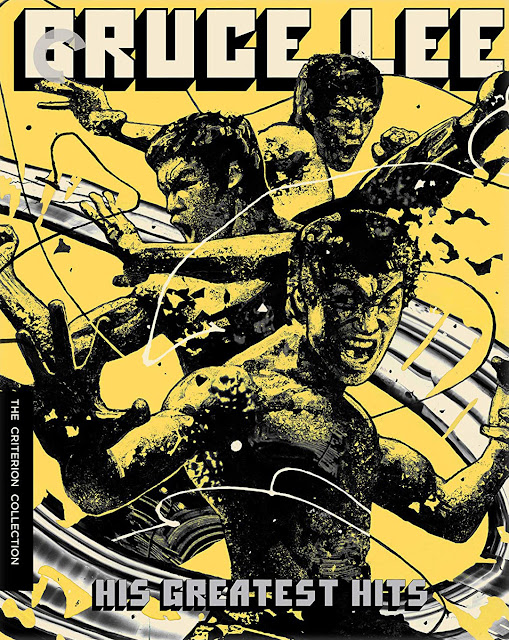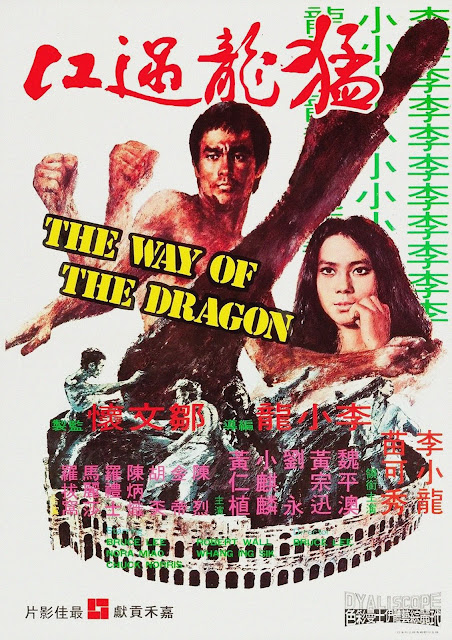In general terms I have always been a Bruce Lee fan. But my respect for his talents was limited to his role as Kato on The Green Hornet, his appearance in the movie Marlowe, and the blockbuster flick Enter the Dragon. I knew Lee had made himself a star with some films made in Hong Kong, but I've never seen them all until recently and then not in their original forms. That oversight has been rectified and I can say unequivocally I am a Bruce Lee fan thanks to the Criterion Collection set Bruce Lee - His Greatest Hits. Bruce Lee was a man of enormous talents and a man who knew what he wanted. He was poorly treated in Hollywood, his Chinese heritage becoming a barricade to his dreams of success in feature films. Even television was closed to him (despite his electrifying turn as Kato) when a role he largely created was stolen from him and given to David Carradine in the show Kung Fu. With that final slap in the face, he said farewell to Hollywood and went back to Hong Kong to make movies.
Golden Harvest films was the new kid on the block, trying to find a niche in the marketplace alongside the behemoth Shaw Films. Raymond Chow made a deal with Bruce Lee for small money by Hollywood standards but impressive by Hong Kong standards for two films. The first was The Big Boss in which he was to co-star alongside James Tien. But Lee's presence on film was so instantly recognized that Tien was made the co-star and given an early exit from the film's story setting up the ferocious fighting finale starring Lee. It's a humble story about workers in an ice factory who are unaware their operation is being used for drug shipments by the titular "Big Boss". When workers begin to go missing things get more and more dangerous resulting ultimately in massive deaths. Filled with righteous fury we see our new hero Bruce Lee seek out the "Big Boss" and proceed to kick ass on an epic scale. The movie was a blockbuster by Hong Kong standards and Bruce Lee was on his way.
The second of the movies in his deal with Golden Harvest was titled Fist of Fury. There has been confusion over this since when these films came at last to America the titles were switched, and The Big Boss was called Fist of Fury and this one was titled The Chinese Connection thought that title made no sense. In this we get a story which is partly true. When a real-life master of Kung Fu is murdered, many suspected the Japanese who at the time were dominant in Shanghai at the time. This movie takes that suspicion as fact and gives us Bruce Lee as the furious student of the murdered master who despite many warnings from his fellow students and the police seeks the murderers among the Japanese fighters. He is relentless and his Kung Fu is far too potent for any to deny him his revenge. Ultimately, not unlike the previous movie there is a great number of tragic deaths, but not before Bruce Lee as the hero has kicked butt on an epic scale. The movie, which some regard as the greatest martial arts movie ever made, was even more successful than its predecessor. Bruce Lee could write his own ticket at last.
So, his next movie The Way of the Dragon saw Lee not just as the star, but also as the writer and director as well. Bruce Lee was at the top of his game, in control of his destiny and he used that power to tell the story of a powerful Kung Fu fighter who is sent to Rome to assist some distant family members who are trying to run a restaurant and avoid the pressures brought against them by the local mob. Bruce is called upon to kick ass repeatedly in this one, facing not only simple hoods, but martials arts enforcers brought in to defeat him. Among these enforcers is Bob Wall, a student of Lee's and another more famous student of Lee's named Chuck Norris. (Whatever happened to that guy?) The story leads inevitably to an epic clash in the ruins of the Colosseum between Lee and Norris, regarded by some fans as the greatest duel in martial arts history. Way of the Dragon did even better at the box office than the previous two films and Lee prepared for his next movie, but then Hollywood called.
Enter the Dragon was the only Bruce Lee feature I'd seen all the way through before I picked up the Criterion Collection. I even bought a copy of this wildly successful movie, but at the time I might have been more motivated by its similarity to a James Bond flick than anything having to do with Bruce Lee. But upon seeing Lee's incredible fights in this blockbuster, I was a convert to his cult. Hollywood wanted Lee but once again showed timidity when they cast alongside him John Saxon and Jim Kelly. The point seemed to be to make sure folks didn't quite realize Lee was the star, but additional scenes shot by Lee himself made that evident as if Saxon's mundane fighting skills and Kelly's memorable efforts could hold a candle to Lee's magnificence. In this one Lee is a secret agent sent to a martial arts contest arranged by a villain who hides on a remote island. The mission is to find out the villain's scheme and if possible, put a stop to it. That's handled in stunning style as Bruce Lee announced his presence to world at long last.
Released in the same year as Game of Death, the movie Circle of Iron is a movie which Bruce Lee wrote...sort of. When Lee had been Hollywood before his sojourn to Hong Kong, he'd partnered with his student James Coburn and others to fashion a story called The Silent Flute (the original and superior name of the movie before the studio insisted on something more aggressive if meaningless). This was a fantasy tale meant to showcase the very Eastern ideas of Zen. It wasn't made for a host of reasons, but when Lee became wildly successful, he was offered the chance to make the movie but turned it down, thinking it was part of his past and not his future. Years later it was made with David Carradine (ironically enough) in Lee's role about a man seeking wisdom. He encounters strange beings who give him challenges and information which ultimately lead him to understand the wisdom he sought was within him all along. The movie features Christopher Lee, Roddy McDowall, and Eli Wallach. The latter was exceedingly funny as a man who has immersed himself in oil for ten years to wither his lower body freeing him of his sexual urges which limit his ability to find happiness. That scene aside, the movie is kind of a mess with interesting elements which fall flat. But it was written in part by Bruce Lee and that carries some cache. I should point out that Circle of Iron is not part of the Criterion collection in which I found Lee's other movies. I picked it up from the Blue Underground.
Rip Off










I've just realised that the only Bruce Lee movie I've ever seen is Enter the Dragon. Not really a Kung Fu fan though. I saw the movie when it first came out and have a DVD of the uncut version - though not watched it yet in the many years I've owned it.
ReplyDeleteEnter the Dragon is certainly the most polished of the Bruce Lee films, but I now know his earlier stuff for Golden Harvest has much more intensity and emotion.
DeleteThe 'Kung Fu' TV series was shown here in the UK and we kids all imitated the "grasshopper" line. But I didn't know Bruce Lee was originally intended for the role until a few years ago. Obviously times have changed a lot and a white actor playing a Chinese character would be totally unacceptable nowadays.
ReplyDeleteIt's exceedingly regrettable. It's difficult to imagine someone other than the torpid Carradine in the role now, but imagine how much better the fights might have been. Actually, the series was almost certainly stolen from Lee, he'd pitched something very much like it, and had gotten little response and then suddenly this show was happening and didn't even get an audition.
DeleteYeah. But the fights would have been so much better.
Delete